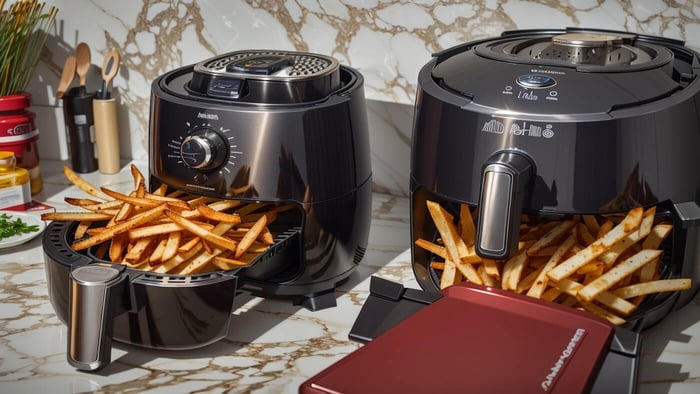Can you have an air fryer in a dorm? What about a mini-fridge? Microwave? or Electric kettle? As students prepare to arrive to campus, Residence Life offices find themselves inundated with these questions from incoming students and parents. Many students want to avoid being constrained to the dining hall for every meal and having some basic cooking equipment in the dorm allows students to have more control over their meals, to whip up a quick breakfast and coffee before heading to an early morning class or enjoy a late night indulgence if you're studying at night after the dining halls have closed.
This leads to the question - can a student have an air fryer, or any other cooking appliance, in a dorm? Which appliances are likely to conform to housing regulations while occupying minimal space and giving students the flexibility to prepare hot meals or keep beverages cool?
Every school has its own rules regarding what appliances students are permitted to keep in their dorm room. Ultimately, you will need to contact your school to determine what's allowed. But to help you prepare for school, we have done our best to answer "Can you have an air fryer in a dorm?" and other common student questions about which appliances you can and should take to school with you.
Consider whether your living arrangement includes a kitchen
If you live in a student apartment, an on-campus house or otherwise have access to a kitchen, this may expand the number of appliances that you are permitted to bring from home, as long as the appliances are used in the kitchen area. If you are in a traditional dorm or residence hall that includes only a bedroom, you may face more restrictions about the types of appliances you are permitted to keep in your room. Many residence halls do have a communal kitchen area which may already have a refrigerator, a microwave, and possibly a stove or other countertop cooking appliances.
If your school does permit you to have heating kitchen appliances, an air fryer is worth considering. They are generally user-friendly with preset cooking functions and the ability to cook a wide variety of foods. They are compact to save countertop space, cook food quickly with minimal preparation required, and can easily be cleaned with soapy water or in the dishwasher. There are other appliances also worth considering if you have kitchen space. Read on to learn more about what other students have found useful.
Can you have an air fryer in a dorm if you do not have a kitchen?
If your living arrangement includes only the bedroom, or the bedroom and a common area, you are likely to face more restrictions regarding the appliances you are permitted to have in your room. College dorms have specific regulations and guidelines in place to ensure the safety and well-being of all residents. That being said, we know that many students don't have a private kitchen in their housing arrangement and we have tried to compile a list of dorm-friendly appliances. You may not be allowed to have an air fryer, but your living arrangement doesn't need to hinder your culinary creativity.
Some dorms may have restrictions on appliances with heating elements due to fire hazards, so it's important to check the rules and regulations set by your housing department. However, many colleges allow small appliances like rice cookers, coffee makers, and toaster ovens. Even an air fryer may be permitted as long as it meets certain safety criteria.
Which appliances might a student want to bring to school, if they're allowed?
Mini Fridge
Mini fridges are almost universally permitted in dorm rooms due to their low risk of overheating or otherwise creating a safety hazard. Having a mini fridge allows students to store and keep their favorite snacks and beverages within arm's reach. Mini fridges come in various sizes and designs to fit different dorm room configurations. They often feature a separate freezer compartment for ice and frozen meals. Whether you need to store beverages for late-night study sessions or keep leftovers from the dining hall for a quick meal, a mini fridge is a must-have appliance for any college dorm room.
Microwave
Microwaves offer convenience and quick meal preparation. As a college student, you often find yourself pressed for time between classes, studying, and other commitments. A microwave allows you to easily heat up quick meals or snacks like popcorn without the hassle of cooking on a stove or oven. With a microwave, you can enjoy a warm and delicious meal using leftovers from the previous night's dinner or easily cook frozen foods like pizza, burritos, or microwaveable meals. And nothing beats having the ability to heat up a mug of tea or hot chocolate on a chilly day. Microwaves are also commonly permitted in college dorm rooms. Your residence hall common area or kitchen may already have one, however many students prefer the convenience of having one in their room. Consider choosing a small countertop model that will take up minimal space.
Coffee Maker
Some schools prohibit coffee makers that have an external heating element or hot plate but allow pod-style coffee makers like Keurig or Nespresso, which have an internal heating element. One popular choice is the single-serve coffee maker, such as the Keurig. These machines are convenient and easy to use, allowing students to quickly make a cup of coffee with just the push of a button. They offer a variety of flavor and strength options and need minimal cleaning. Traditional coffee pots that brew drip-style coffee often have an external hot plate and so may not be permitted in a dorm but can be an option if you have access to a kitchen. These coffee makers are great for those who like to enjoy multiple cups of coffee throughout the day or who like to brew coffee for a group of friends. They often come with programmable timers, allowing students to wake up to the aroma of freshly brewed coffee. French press coffee makers are gaining popularity among dorm dwellers but require that you have the ability to heat water using a stove, electric kettle or microwave. With their simple and elegant design, they allow students to brew a rich and flavorful cup of coffee. They don't require electricity, making them ideal for dorm rooms with limited kitchen space or when power outlets are not easily accessible.
Rice Cooker
A rice cooker is a popular and practical appliance for college dorm rooms. It offers a convenient and easy way to cook rice, but also a variety of other dishes including vegetables, fish, and soups. With a rice cooker, students can cook their own meals without having to rely on the limited options available in the dining hall or resort to frozen meals. Rice cookers typically have adjustable temperatures and settings that allow for perfectly cooked rice every time. Plus, rice cookers are compact and take up minimal space, making them ideal for dorm room living.
Electric Kettle
An electric kettle is a common and convenient appliance found in many college dorm rooms. With morning classes and the need for a quick caffeine fix, having an electric kettle allows students to easily make a cup of coffee or tea without the hassle of going to the dining hall or using a communal kitchen. Electric kettles are compact and take up minimal space, making them ideal for dorm room living. Additionally, electric kettles heat water quickly and efficiently, providing hot water for various purposes such as instant noodles or oatmeal. With adjustable temperatures and features like removable water reservoirs, electric kettles offer convenience and versatility for college students. Whether you're a coffee lover, tea drinker, or just need hot water on demand, an electric kettle is a must-have appliance for any college dorm room. Remember to inquire with your housing office about whether electric kettles are allowed.
Toaster Ovens
Toaster ovens come with various cooking settings that allow you to bake, broil, toast, and more. This versatility gives you the freedom to experiment with different recipes and cook your favorite foods exactly the way you like them. Compared to traditional ovens, toaster ovens cook faster due to their smaller size and wattage. Whether you're heating up leftovers or making a quick meal, a toaster oven can save you time and ensure your food is ready in a jiffy. Its compact size makes it perfect for dorm rooms where space is limited. Toaster ovens are often prohibited in dorm rooms because of the open heating element and risk of fire if unattended, however they are an attractive option if you have a kitchen.
Air Fryers
Air fryers have gained popularity among college students as a convenient and healthier alternative to traditional deep frying. These countertop convection ovens use hot air circulation to cook food, resulting in crispy and delicious meals and treats. Fire hazards are often a major concern with air fryers and so they may be prohibited from dorms unless used in the kitchen. Air fryers cook food much faster than a traditional oven or toaster, allowing college students to quickly prepare a meal without spending too much time in the kitchen.
Safety and Smoke Alarm Considerations
First and foremost, it is crucial to carefully read and follow the manufacturer's instructions for your specific air fryer (or any other appliance) model. These instructions will outline the proper usage and safety guidelines.
When using an appliance with a heating element like an air fryer, electric kettle or hot plate in your dorm room, always remember to unplug it after use and avoid leaving it unattended while cooking. This will help prevent any potential accidents or damage.
Use caution when handling hot food from the air fryer to avoid burns or injuries. Adequate ventilation is also important, so make sure the area where you use the air fryer is well-ventilated to prevent smoke or odor build-up.
It is also important to take into account the presence of smoke alarms. The use of certain appliances, like air fryers, can potentially trigger the smoke alarm, leading to unnecessary disruptions.
Smoke alarms are an important safety element and you should only use heating appliances within the vicinity of a smoke alarm, however you may consider not placing the appliance directly below a smoke alarm to avoid accidentally triggering the alarm when cooking safely. Additionally, make sure to clean the appliance regularly to eliminate any accumulated food particles that may cause excessive smoke during the cooking process.





